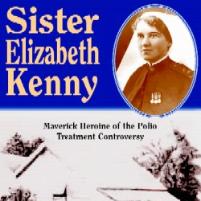Book Review: Sister Elizabeth Kenny
Published on 20 February, 2003
SISTER ELIZABETH KENNY; Maverick Heroine of The Polio Treatment Controversy.
By Wade Alexander.
Central Queensland University Press.
RRP $25.95.
Here is a quite extraordinary slice of Australian outback history. It is the life story of Sister Elizabeth Kenny, a Queensland bush nurse from the village of Nobby on the Darling Downs which is also the home territory of the famous Steele Rudd.
Sister Kenny served on darkened military troop ships in WW1, and later invented a stretcher designed to stabilise outback patients being transported to hospital. From the 1930s to the 1950s she showed a unique blend of bulldozer determination and media-savvy manipulation of the press. As a relatively uneducated bush nurse she took on the medical hierarchies of the world. She was convinced that she was right and the scientific doctors were wrong. She developed a unique treatment for polio and paralysis and ignited a controversy which has never been resolved. In the early 1950s, researchers successfully tested the Salk vaccine and childhood vaccination programs began. (I still remember lining up for my own vaccination at Harbord School in the 1950s.).
 This new book, Sister Elizabeth Kenny: Maverick Heroine of the Polio Treatment Controversy, illuminates Kenny's life with biographical detail never before published. Author Wade Alexander was himself treated for polio in the USA during WWII. His mother used the Kenny method and Alexander credits this treatment to the fact that he went on to walk and to lead a normal life. His unusual recovery inspired him in later years to find Sister Kenny's autobiography, And They Shall Walk. He was moved to tears and went on to research and write Sister Kenny's life story.
This new book, Sister Elizabeth Kenny: Maverick Heroine of the Polio Treatment Controversy, illuminates Kenny's life with biographical detail never before published. Author Wade Alexander was himself treated for polio in the USA during WWII. His mother used the Kenny method and Alexander credits this treatment to the fact that he went on to walk and to lead a normal life. His unusual recovery inspired him in later years to find Sister Kenny's autobiography, And They Shall Walk. He was moved to tears and went on to research and write Sister Kenny's life story.
Doctors treating child polio victims right up until the 1950s followed the conventional medical wisdom, which called for sad little patients to be immobilised in splints, casts and iron frames. It all seems unbearably cruel. Then Sister Kenny introduced her radical new technique. She castigated immobilisation as causing deformities. She called for heat and hydrotherapy treatment, with carefully guided passive movements and re-education of the child's affected muscles.
Sister Kenny first confronted medical authorities in the early 1930s during a test of her work in Townsville. She subsequently travelled to the USA in 1940 where, in spite of ongoing opposition, she achieved extraordinary success. She and Minneapolis City officials established the Sister Kenny Institute. President Franklin D. Roosevelt, a polio victim who spent most of his adult life working from a wheelchair, invited her for a luncheon in June of 1943. Time, Colliers, Life and Newsweek all published articles about her and her work, and Hollywood released a movie of her life in 1945, with Rosalind Russell starring as Sister Kenny, . However, Kenny was still opposed by many conservative medical authorities. Though often deliberately confrontational with doctors, Kenny was always kind and gentle with children.
Biographer Wade Alexander speculates about the contradictory character of Sister Kenny:.
Kenny's initials, SK, contain the essence of the two sides of her personality. S represents the soft, caring, nurturing, aspect of Elizabeth - the nurse/care-giver. K represents the confrontational, teaching, castigating, task-setting, letter-writing, speech-giving Elizabeth Kenny: the Kenny-Irish-blarney-tale telling woman who strode in, took over a room and told it like she believed it was. She may have been a reincarnation of Bridged of Kildare, the mythical woman Bishop who led a monastery in Ireland when the "...Irish saved Western civilization." .
The issue of alternative versus traditional medicine is more alive now than ever because today nearly 50 percent of Americans and Australians visit alternative practitioners. The question is: Could a media phenomenon like Sister Kenny ever arise again? Could someone come along one day with an unconventional, unscientific treatment for HIV or hepatitis C? I wonder how we would all react.
Professor David Myers - 'Old Silvertail'.
Publisher, Central Queensland University Press .
CQU-Gold Coast .
60 Marine Parade, Southport, Q 4215 .
Phone: 07-5552-4960. d.myers@cqu.edu.au .
www.outbackbooks.com

